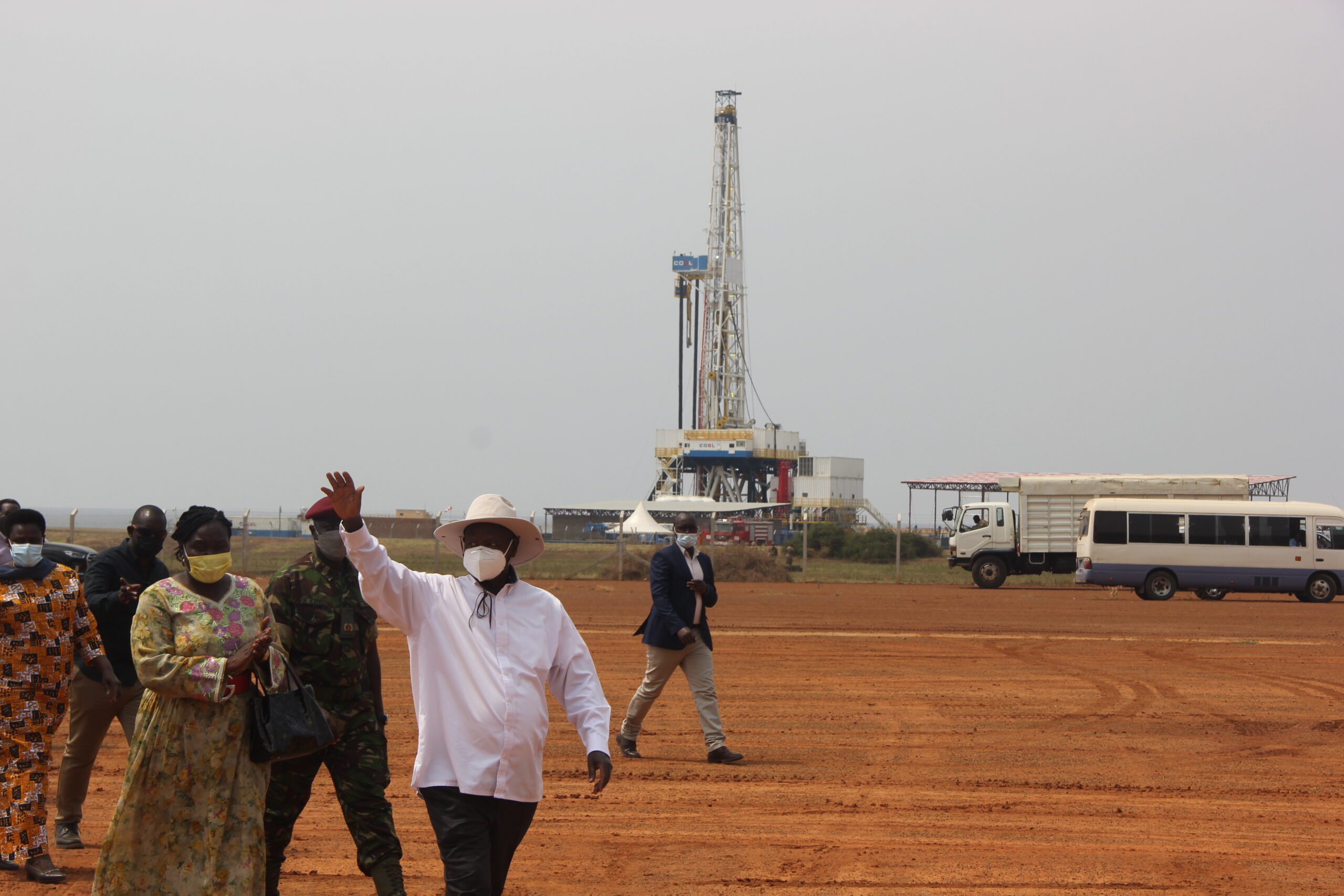An oil drilling programme at Kingfisher Development Area (KDA) in Buhuka village, Kyangwali Sub-County, Kikuube district, has started.
The drilling rig which arrived in Uganda in September and its installation works concluded in November last year was switched on by President Yoweri Museveni on Tuesday to start actual drilling works.
Kingfisher Oil field which is operated by China National Offshore Oil Corporation (CNOOC) Uganda Limited, on the shore of Lake Albert, has a planned central Processing Facility (CPF) with a capacity of 40,000 barrels of oil per day and 31 oil wells to be drilled on 4 well pads, 16 kilometres of flow lines and a 55-kilometre feeder pipeline from the CPF, to the export hub and the proposed oil refinery at Kabaale parish in Hoima district.
Twenty of these wells will be used to produce oil while 11 of the wells will be used to inject water in the reservour to help improve production.
Uganda discovered 6.5 billion barrels of oil in 2006 of which 1.4 billion barrels is considered to be recoverable in the Albertine Graben.
Museveni commended the oil companies and scientists that have made everything possible to ensure Uganda gets its oil from the ground by 2025.
He recollected about how he opted to first train Ugandan scientists rather than rushing to sign contracts with BP and Shell, after coming into power in 1986.
He said he opted to first send Ugandan scientists abroad for training , who looked for the said oil because he had little knowledge regarding oil matters.
He added: “This should be a big lesson for leaders to avoid bumping into issues which has most times culminated into them making mistakes.”
Subsequently, the President said, they started working with smaller companies and afterwards got big firms like CNOOC and TotalEnergies whom he hailed for not listening to saboteurs of oil developments.
“I particularly thank CNOOC Uganda Limited because they are moving and I hope others are also moving. And the Chinese government who encouraged their company to come and invest here. We have been working with them since the 1950s in liberating our people and now we are in economic cooperation for mutual benefit,” Museveni said.
“I also thank the government of France because I have not heard them making trouble apart from the European Parliament which I told to go to hell,” he added.
Museveni said his government was going to alongside oil, fasttrack other renewable energy sources such as solar, wind and hydropower, among others which are said to emit less carbon into the biosphere.
However, Museveni said oil was not a problem at all because the carbon dioxide which comes from it, is also “not problematic” if well handled.
He said when others are fully developed still oil is needed for other uses like tar to make roads and fertilizers-nitrogen from ammonia for agriculture.
The President said oil will be here to stay. He said the country will get more oil because the available barrels are after only exploration of 40% of the entire Albertine-Butungi valley.
He said based on exploration data from others such as Kadami-Moroto basin, Kyoga basin, Hoima basin-between Hoima and Masindi-Kafu area, the country is poised for more oil.
“So we shall look for oil in these prospective blocks and use them carefully for a long time.”
He reiterated his call for people to prepare and tap opportunities which will be brought by the oil industry.

“I have had local content but for me the biggest content which all of you can participate in is agriculture since all these people working in oil need food. Do they eat computers? No. grow food like eggs, food, chicks, such that these people buy food from you people,” he added.
Ruth Nakabirwa, the minister for energy said this comes less than a year after the country signed a final investment decision for the upstream and construction of the 1,443-kilometre-long heated East Africa Crude Oil Pipeline (EACOP) which will transport oil to Tanga port.
Nankabirwa said an Environmental Impact Assessment (ESIA) for the proposed oil refinery is already done and the Albertine Energy Consortium undertook Front-end engineering and design which was approved by the government in July last year.
Ernest Rubondo, the Executive Director for Petroleum Authority (PAU), the sector regulator, said the Kingfisher field construction is to be handled by China Oilfield Services Limited (COSL) at a cost of $2b over the next three years where another $1.5b will be spent over the next 20 years in operation and maintenance of the field.
He said last year $346m was injected in the project in 2022 and $680m is to be invested this year and an additional $528m in 2024.
Rubondo said the recoverable cost of Kingfisher oil field is $22 per barrel compared to international standard of $25 per barrel and will account for the 15% of the total revenues the government expects to get from oil.
He said this will be $6.9b over the entire project lifespan of 20 to 30 years. Peter Banura, the Kikuube district chairperson, asked the government to invest back proceeds from oil into improving social services in the area since they are the ones to be directly impacted by its extraction.
He asked for extension of electricity to boost small scale business, ferry services to ease transportation of goods and services between Uganda and DR Congo, more roads and upgrading of Kisaru airfield to harness tourism and ease mobility.
Chen Zhuobiao, the President China National Offshore Oil Corporation- CNOOC Uganda says CNOOC has acquired the 60.5 kilometre long rig that has been established at Well pad 2 with the latest technology that will help drill the oil found offshore with less footprint on the environment.
Zhuobiao said land acquisition was concluded and the livelihood restoration programmes done in accordance with approved International Financial Standards.

